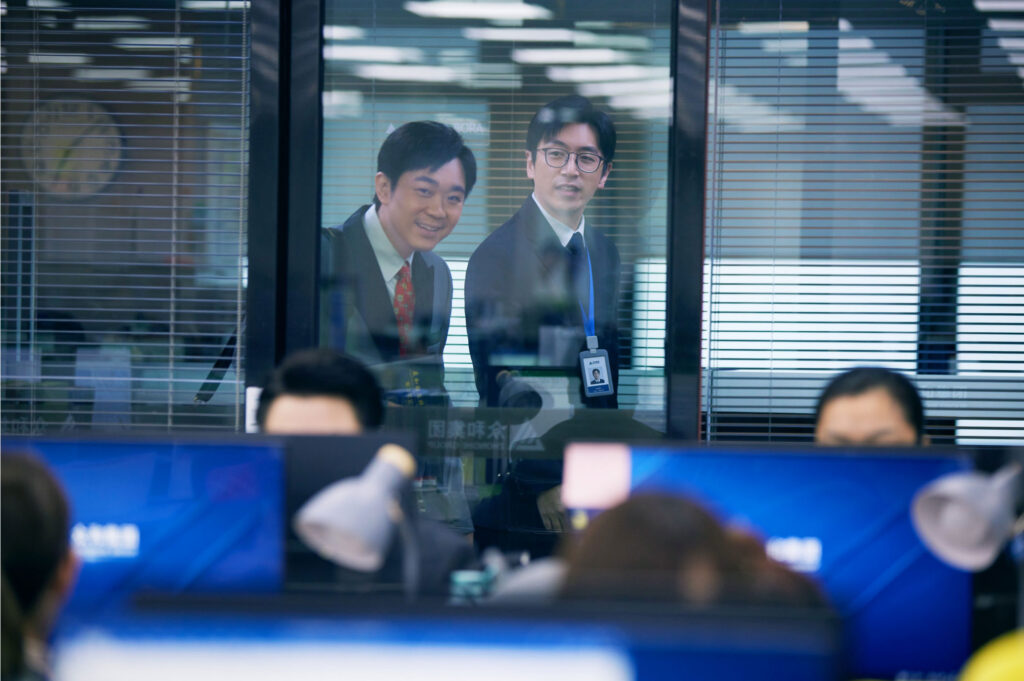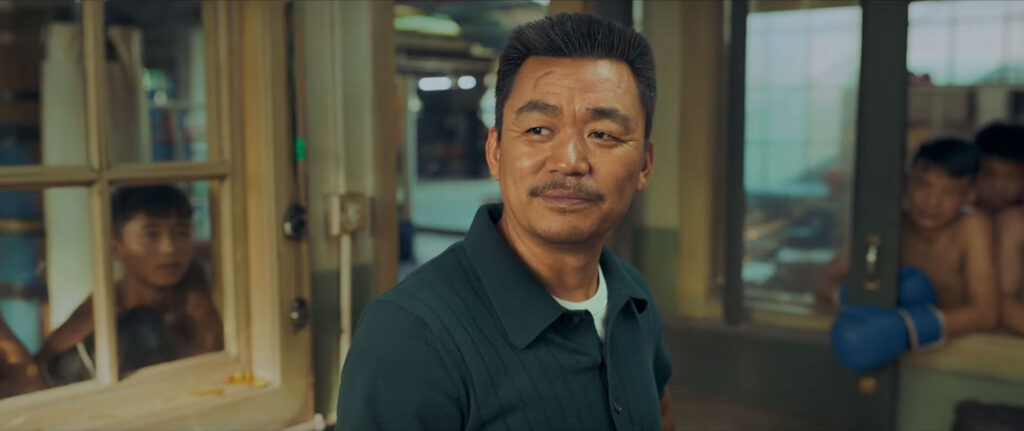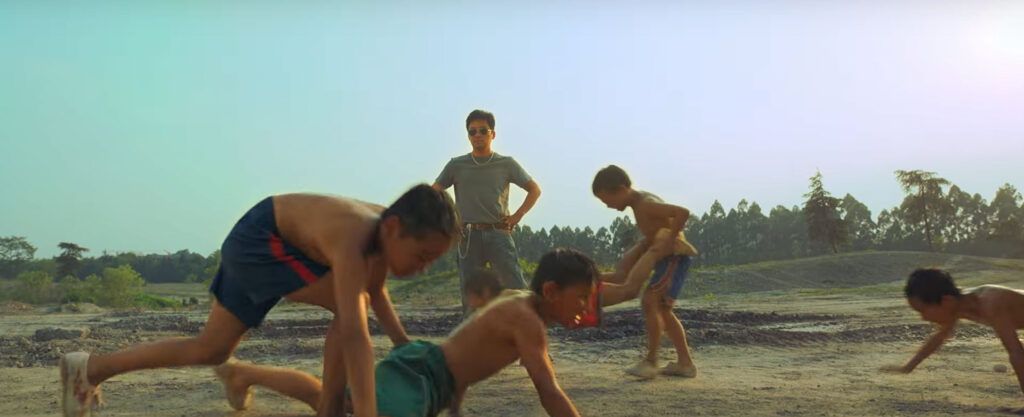January 27, 2023
by Carla Hay

Directed by Dong Runnian
Mandarin with subtitles
Culture Representation: Taking place in China, mostly in 2017, the comedy film “Johnny Keep Walking!” features an all-Asian cast of characters representing the working-class, middle-class and wealthy.
Culture Clash: Due to an identity mixup, a factory worker for a large corporation accidentally gets promoted into an executive manager position, while the staff relations manager who made this mistake tries to cover it up.
Culture Audience: “Johnny Keep Walking!” will appeal primarily to people who are interested in watching workplace satires that try to do too much with a flimsy and thin plot.

“Johnny Keep Walking!” starts off looking like a screwball satire of how corporate managers have such little regard for employees, they treat employees as interchangeable and disposable. But then, the movie bizarrely turns into a somewhat preachy comedy lecture about how corporate workers can find gratitude and happiness on the job if they find a way to charm their irresponsible or callous managers. The intended sharp parody of corporate incompetence is weakened by too much sentimental corniness, especially near the end of the movie. It’s overstuffed with too many unnecessary characters. It’s a one-joke film stretched to irritating limits.
Directed by Dong Runnian (who co-wrote the “Johnny Keep Walking!” screemplay with with Luojia Ying), “Johnny Keep Walking!” begins in 1998. A China-based corporation called Zonghe Group (which makes equipment parts, such as bolts and studs) is having its annual gala, which includes a talent show for employees. One of the company’s main production facilities is the Zonghe Standard Component Factory, which is in a different city from Zonghe’s corporate headquarters. The movie doesn’t mention the names of the cities where the factory and corporate headquarters are located.
At this company gala in 1998, a factory employee named Hu Jianlin (played by as Chengpeng Dong also known as Da Peng) is shown swinging from a wire, as if he’s some kind of comedic acrobat. The performance is well-received, until it ends disastrously when Jianlin crashes to the ground. Viewers soon find out that despite this mishap, Jianlin loves to perform at the company gala’s talent show every year. He has a happy-go-lucky personality that can sometimes be considered clownish. Zonghe Group is led by a typical ruthless mogul named Chairman Hu (played by Ouyang Fenqiang), who cares more about profits than people.
The movie then fast-forwards to 2017. Jianlin, a bachelor with no children, is still working in an assembly-line job at Zonghe Standard Component Factory. His title is senior fitter. He is looking forward to performing as a singer at the annual company gala. In order to do so, he has to put in an application every year. Not everyone will be chosen to perform, but Jianlin has been chosen every year, so he’s not worried. Performing at the company gala has become a tradition for him that he expects to continue.
One day, Jianlin gets some shocking news: He’s been promoted to become a mid-level manager at Zonghe’s corporate headquarters, even though he has no managerial experience and no business education. This promotion means that he will have to leave all of his factory co-worker friends behind, but Jianlin is excited and curious about this new job opportunity. His co-worker friends at the factory seem to be happy for him, but they are confused over why Jianlin was given this promotion, since he previously showed no interest in being a corporate manager.
Meanwhile, someone who is not happy about this promotion is middle-aged Zhuang Zhengzhi (played by Wang Xun), a supply manager at Zonghe Standard Component Factory. Zhengzhi had applied for this promotion not just because he wants an elevated title and a higher income but also because he wants to move to the city where Zonghe is headquartered so his children can go to a better school. Zhengzhi is enraged that an unqualified Jianlin got the promotion instead
There’s a big reason why Zhengzhi was expecting this job promotion: Zhengzhi did unethical things for a middle man named Hou Chengsi (played by Yang Lei), who promised that in return for these illegal business practices, Zhengzhi would get the job promotion. When Zhenghzi tries to call Chengsi, he is dismayed to find out that Chengsi can’t be reached on his phone. Zhenghzi interprets Chengsi’s sudden inaccessibility as Chengsi deliberately avoiding him. However, later, Zhengzhi gets a strange phone call from Zonghe headquarters where someone asks him to sing over the phone as an audition.
At Zonghe’s corporate headquarters, an awestruck Jianlin is given an office tour. He is amazed that corporate managers have their own spa and don’t do as much work as he thought. During his first few days on the job, Jianlin meets several executives. They include director of human resoures Thomas (played by Mu Da), deputy director of human resources Peter (played by Sun Yizhou, also known as Sean Sun; deputy director of human resources Jeffrey; and deputy head of staff relations/company culture Ma Jie (played by White-K, also known as Bai Ke), who goes by the name Magic.
Magic has a one-on-one meeting with Jianlin and tells him that Jianlin’s income in his new job can be up to ¥360,000 a year, which is more than $50,000 in U.S. dollars. Jianlin has never made that much income before, and he doesn’t quite believe it. He asks Magic if he can record a video on Jianlin’s phone of Magic stating this salary for Jianlin, so he can have it has evidence. It’s one of many examples that the movie has to show how Jianlin is ignorant about corporate customs.
Magic also tells Jianlin that because Zonghe is an international company, all of the executives must choose an English-language first name to make it easier to communicate with English-speaking business collegaues. After some back-and-forth dialogue, they decide that Jianlin’s English-language name will be John, nicknamed Johnny.
Shortly after this meetng, Magic finds out he had made a huge mistake: He mixed up Jianlin’s talent show application with Zhengzhi’s promotion application. He decides to himself that he can cover up this mistake, as long as he prevents Jianlin/John from doing anything important. Most of the movie is a series of repetitive and wacky predicaments of Magic trying to keep his mistake a secret while Jianlin/John naïvely works his way up Zonghe’s corporate ladder and Zhengzhi plots his revenge.
All of that would be enough for one movie, but “Johnny Keep Walking!” crams in suplots about corporate downsizing and exploitation of temporary workers. Zonghe has about 60,000 employees and plans to lay off a great deal of them. Most of the employees who are let go are lower-level workers, while the high-ranking executives not only get to keep their own jobs, they often get bonuses or raises. When the layoffs start to happen, the remaining employees become unsettled and paranoid that they will be the next to lose their jobs.
Meanwhile, Jianlin/John gets to know a cynical Zonghe employee named Pan Yiran, also known as Penny (played by Zhuang Dafei, also known as Sabrina Zhuang), who works as some type of administrative assistant. She is part of the company’s outsourced group of workers who are considered temporary workers. Penny has been working for Zonghe for the past six years.
Penny has been promised a permanent job at Zonghe, but this permanent job hasn’t happened for her yet. She has become very bitter and impatient about this unfulfilled promise. Like many temporary workers, Penny can’t afford to quit. But she’s disgruntled and is rude to her supervisor, so she often gets reprimanded for her attitude.
“Johnny Keep Walking!” has a brisk, madcap tone to it for most of the movie, but then everything starts turning into hokey mush toward the end of the film. The subplot about the scheming of Zhengzhi and Chengsi is a muddled and far-fetched mess. The annual Zonghe talent show is another subplot that is an awkward part of the story. “Johnny Keep Walking!” fares best when it focuses on lampooning how high-ranking corporate executives are frequently insincere, out-of-touch, and ill-equipped to do their jobs, but all the subplots become distractions and flaws for the movie.
Unfortunately, with too many characters and jumbled subplots, “Johnny Keep Walking!” trips over its own ambition. It’s not a completely terrible film, and some parts succeed in being amusing. The cast members do adequate jobs in their performances. But the movie’s tonal shift at the end is ridiculously hokey. Instead of consistently poking fun at corporate culture, “Johnny Keep Walking” ends up praising corporate culture with a simple-minded conclusion.
Tiger Pictures Entertainment released “Johnny Keep Walking!” in select U.S. cinemas on January 18, 2024. The movie was released in China on December 30, 2023.


